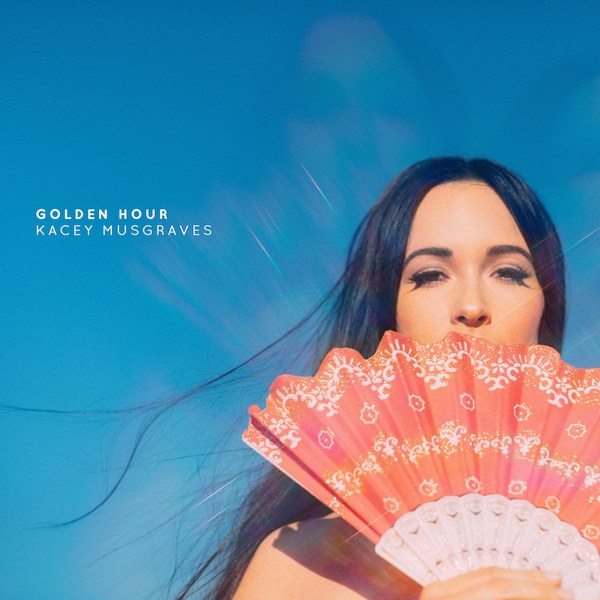Three years ago, in “Dime Store Cowgirl,” country songstress Kacey Musgraves humbly celebrated staying in a hotel with a pool and “felt really small under Mount Rushmore.”
That song was on her sophomore release, “Pageant Material,” but in her latest album, “Golden Hour,” released March 30, Musgraves gets past those insecurities, contributes her own sound to the country genre and digs deep into questions of love and identity.
The album – whose title plays on Musgraves’ hometown of Golden, Texas – seems like exactly where her previous three albums were heading: a blend of traditional country and more contemporary genres, with the same focus on acceptance of self and others.
Like the Nashville Sound artists she emulates, Musgraves’ production is soft and lush.
“Wonder Woman” is the best example of her use of harmonious instrumentals, with an atmosphere and cosmic melody backed by a driving beat that pushes Musgraves’ vocals forward.
 However, the album’s instrumentals and production aren’t without fault. “Oh, What a World,” which has an electronic-sounding, vocoder-recorded intro that sounds more like it belongs on a Daft Punk album than a country one, is probably my least favorite song on the album because of its production – not to mention that the lyrics aren’t particularly interesting or well-written, either.
However, the album’s instrumentals and production aren’t without fault. “Oh, What a World,” which has an electronic-sounding, vocoder-recorded intro that sounds more like it belongs on a Daft Punk album than a country one, is probably my least favorite song on the album because of its production – not to mention that the lyrics aren’t particularly interesting or well-written, either.
Mostly, though, Musgraves’ lyrics are carefully crafted and insightful.
For instance, on “Butterflies,” Musgraves sings, “Kiss full of color makes me wonder where you’ve always been / I was hiding in doubt ‘til you brought me out of my chrysalis / And I came out new all because of you.”
These lines, packed with internal rhymes and a small part of the song’s extended metaphor comparing a new love to a butterfly’s transformation, go to show Musgraves’ writerly instinct.
“Butterflies” is the song that stuck with me the most after listening through the album a few times. This clever song, written a week after Musgraves met her now-husband, is both an accurate depiction of the beginning stages of a romance and a catchy song sure to stay in your head.
On “Golden Hour,” Musgraves’ choruses are often longer than the individual verses, the repetition of which lends the album a pop feel without sacrificing any of the wit and wordplay of Musgraves’ previous songwriting.
The album’s best chorus is in “High Horse,” a disco-tinged yet still twangy song that sounds like something you could dance to in a club but still manages to reference John Wayne. Its chorus is a thing of Western fantasies, with lines like, “So why don’t you giddy up, giddy up / And ride straight out of town,” using the language of Old West tales to tell a story of modern love.
Another song that shows Musgraves’ ability to mess with the language and conventions of country-Western movies and music is “Space Cowboy.”
“Shoulda learned from the movies that good guys don’t run away / But roads weren’t made to not go down / And there ain’t room for both of us in this town,” sings Musgraves as she adopts Western tropes while knocking her partner down a peg by having him drive a Silverado rather than ride a horse.
“Space Cowboy” is an especially satisfying song because of how Musgraves works the title into her lyrics. While the title by itself suggests the blend of futurism and traditionalism the entire song seems to be hinting at, the beginning of the chorus (“You can have your space, cowboy / I ain’t gonna fence you in”) deftly reveals the title’s second meaning.
One thing that Musgraves has always been good at is teaching her listeners morals of acceptance of both themselves and others. On previous albums, songs like “Follow Your Arrow” and “Biscuits” encouraged listeners to be and explore themselves (“Kiss lots of boys / Or kiss lots of girls if that’s something you’re into”) and to let others do the same (“Mind your own biscuits / And life will be gravy”).
Though Musgraves spends a lot of time on “Golden Hour” reflecting on her own life, she does use the song “Lonely Weekend” to admit that she is often lonely and thus validate the feelings of listeners with similar concerns. The song, which is about the speaker’s partner being gone most nights and weekends, still has a story embedded within it, making for a more compelling tune.
There is a tension on “Golden Hour” between the desire for the kind of love that’s “in the movies,” the one Musgraves’ sees in Elvis and Priscilla on “Velvet Elvis” or that appears in the romanticized Western movies of “Space Cowboy,” and Musgraves’ awareness that she’s not Wonder Woman.
It is this tension that makes “Golden Hour” so real and so honest. Rather than painting a picture of unrealistic, ever-infatuated lovers, Musgraves’ album hopes for that but doesn’t shy away from the loneliness, losses and mistakes that are bound to happen in romance.






